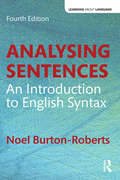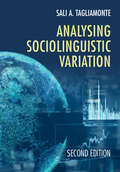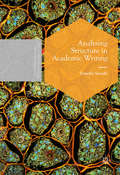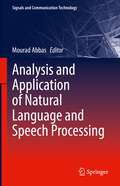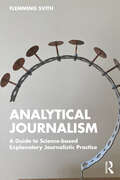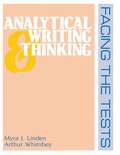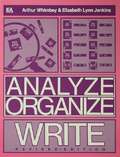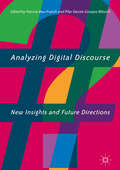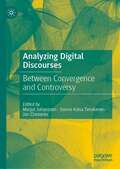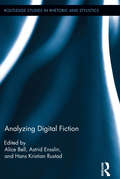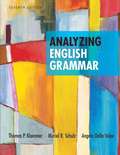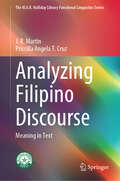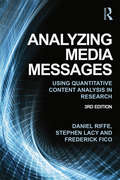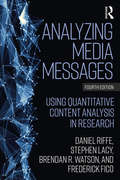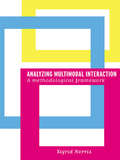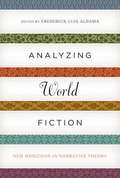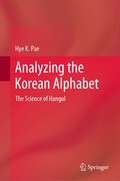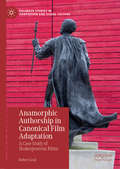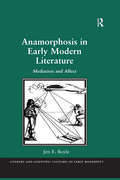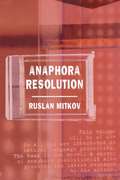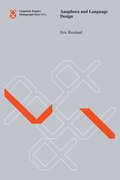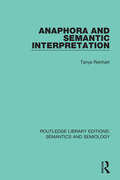- Table View
- List View
Analysing Sentences: An Introduction to English Syntax (Learning about Language)
by Noel Burton-RobertsThis highly successful text has long been considered the standard introduction to the practical analysis of English sentence structure. It covers key concepts such as constituency, category and functions, and also utilises tree diagrams throughout to help the reader visualise the structure of sentences. In this fourth edition, Analysing Sentences has been thoroughly revised and now features a brand new companion website with additional activities and exercises for students and an answer book for the in-text exercises for professors. The extra activities on the website give students practice in identifying syntactic phenomena in running text and will help to deepen understanding of this topic. Accessible and clear, this book is the perfect textbook for readers coming to this topic for the first time. Featuring many in-text, end-of-chapter and Further Exercises, it is suitable for self-directed study as well as for use as core reading on courses.
Analysing Sociolinguistic Variation
by Sali A. TagliamonteNow in its second edition, this is an invaluable manual for teaching and learning variation analysis, the quantitative study of linguistic variation and change. Written by a leading scholar in the field with over thirty years of experience, it provides an insider's view of the methodology through practical, 'hands-on' advice, including straightforward instructions for conducting analyses using the R programming language, the new gold standard for analysis. It leads readers through each phase of a research study based on data gathered in sociocultural contexts, beginning with the selection and sampling of a data source, to hints on successful project design, interview techniques, data management, analysis and interpretation, with systematic procedures provided at each step of the process. This edition has been fully updated, with new insights and explanations in line with recent discoveries in the field, making it essential reading for anyone embarking on their own sociolinguistic research project.
Analysing Structure in Academic Writing (Postdisciplinary Studies in Discourse)
by Tomoko SawakiThis book breaks through formalistic traditions to propose a new generic structure analytical framework for academic writing. The integrated approach, taking lessons from cognitive linguistics and structuralism, offers a foundation for establishing research and pedagogy that can promote diversity and inclusion in academia. The simplicity of the flexible structure analytical model proposed by Sawaki enables the user to analyse diverse instances of genre. Further innovation is made in the analysis of generic structure components by integrating George Lakoff and Mark Johnson's metaphor analysis method, so that the model can account for cultural and ideological patterns that structure our abstract thinking. Using these integrations, the author has established a structure analytical model that can take into account linguistic, cognitive, and pragmatic aspects of genre. Researchers in the fields of linguistics, discourse studies, cultural studies, education, and English for Academic Purposes will be able to use this model to identify whether an atypical instance in academic texts is a result of the writer's individual failure or a failure to understand diversity in academic writing.
Analysis and Application of Natural Language and Speech Processing (Signals and Communication Technology)
by Mourad AbbasThis book presents recent advances in NLP and speech technology, a topic attracting increasing interest in a variety of fields through its myriad applications, such as the demand for speech guided touchless technology during the Covid-19 pandemic. The authors present results of recent experimental research that provides contributions and solutions to different issues related to speech technology and speech in industry. Technologies include natural language processing, automatic speech recognition (for under-resourced dialects) and speech synthesis that are useful for applications such as intelligent virtual assistants, among others. Applications cover areas such as sentiment analysis and opinion mining, Arabic named entity recognition, and language modelling. This book is relevant for anyone interested in the latest in language and speech technology.
Analytical Journalism: A Guide to Science-based Explanatory Journalistic Practice
by Flemming SvithResponding to an increasingly complex and often contradictory barrage of news information, Analytical Journalism offers a first-of-its-kind guide to this emerging form of science-based journalism. Posited as a practical alternative to other more traditional forms of event-driven news reporting, analytical journalism relies on metatheory and methodology to highlight causal factors such as goals, norms, behaviours and social frameworks when covering events. Seen as adjacent to investigative and data journalism, analytical journalism seeks to provide a solution to the simplification and under-reporting of the causal context by drawing on scientific research and data to offer a deeper understanding of news events. Central to this new field is public understanding; providing news consumers with the information they require to navigate and act with nuance in the real world. Drawing on the author’s experience of teaching analytical journalism at the postgraduate level, this book summarises the aims and theory of the field and contains practical tools to help improve journalists’ contribution to shared public knowledge, including methods and examples of identifying and justifying new causal explanations of an issue. Analytical Journalism will be of interest to advanced journalism students and practitioners exploring alternative forms of journalism.
Analytical Writing and Thinking: Facing the Tests
by Arthur Whimbey Myra J. LindenThis textbook is designed to enhance the thinking and writing skills that students need for both academic and occupational success. It helps to prepare students for the verbal portions of the SAT, PSAT, ACT, GED, and GRE and offers tips on how to pass writing tests often required for promotion/graduation and on-the- job writing assignments.
Analyze, Organize, Write
by Arthur Whimbey Elizabeth Lynn JenkinsThis book offers students a method for understanding and mastering the rhetorical patterns that comprise expository writing. Its exercises ask students to arrange jumbled sentences into logical order, forming model essays for standard rhetorical patterns such as comparison/contrast, classification, and thesis support. These techniques force students to see the basic logic of different writing patterns. The goal of Whimbey's workbook is to teach the student to write concise and original essays on any topic.
Analyzing Digital Discourse: New Insights and Future Directions
by Pilar Garcés-Conejos Blitvich Patricia Bou-FranchThis innovative edited collection presents new insights into emerging debates around digital communication practices. It brings together research by leading international experts to examine methods and approaches, multimodality, face and identity, across five thematically organised sections. Its contributors revise current paradigms in view of past, present, and future research and analyse how users deploy the wealth of multimodal resources afforded by digital technologies to undertake tasks and to enact identity. In its concluding section it identifies the ideologies that underpin the construction of digital texts in the social world. This important contribution to digital discourse studies will have interdisciplinary appeal across the fields of linguistics, socio-linguistics, pragmatics, discourse analysis, gender studies, multimodality, media and communication studies.
Analyzing Digital Discourses: Between Convergence and Controversy
by Marjut Johansson Sanna-Kaisa Tanskanen Jan ChovanecThis book contributes to the scholarly debate on the forms and patterns of interaction and discourse in modern digital communication by probing some of the social functions that online communication has for its users. An array of experts and scholars in the field address a range of forms of social interaction and discourses expressed by users on social networks and in public media. Social functions are reflected through linguistic and discursive practices that are either those of ‘convergence’ or ‘controversy’ in terms of how the discourse participants handle interpersonal relations or how they construct meanings in discourses. In this sense, the book elaborates on some very central concerns in the area of digital discourse analysis that have been reported within the last decade from various methodological perspectives ranging from sociolinguistics and pragmatics to corpus linguistics. This edited collection will be of particular interest to scholars and students in the fields of digital discourse analysis, pragmatics, sociolinguistics, social media and communication, and media and cultural studies.
Analyzing Digital Fiction: Analyzing Digital Fiction (Routledge Studies in Rhetoric and Stylistics)
by Astrid Ensslin Alice Bell Hans Kristian RustadWritten for and read on a computer screen, digital fiction pursues its verbal, discursive and conceptual complexity through the digital medium. It is fiction whose structure, form and meaning are dictated by the digital context in which it is produced and requires analytical approaches that are sensitive to its status as a digital artifact. Analyzing Digital Fiction offers a collection of pioneering analyses based on replicable methodological frameworks. Chapters include analyses of hypertext fiction, Flash fiction, Twitter fiction and videogames with approaches taken from narratology, stylistics, semiotics and ludology. Essays propose ways in which digital environments can expand, challenge and test the limits of literary theories which have, until recently, predominantly been based on models and analyses of print texts.
Analyzing English Grammar
by Thomas P. Klammer Muriel R. Schulz Angela Della VolpeWhile drawing upon traditional, structural and transformational grammatical theory, the primary purpose of this book is to provide sound pedagogical grammar instruction. Taking an eclectic approach, this effective learning tool is designed to support and assist learning about the structure of English. Unlike similar books, Analyzing English Grammar directly addresses its audience with understandable language and clear explanations. From cover to cover, it models the techniques of step-by-step linguistic analysis that the authors teach in their own classes. Numerous exercises help readers move from mastering clear, prototypical cases toward critical analysis of the more complex and borderline fuzzy grammar examples that characterize actual language. Includes the conventions of Standard English in a context of regional, social, and stylistic variation. Grammatical concepts are applied to practical writing problems.
Analyzing Filipino Discourse: Meaning in Text (The M.A.K. Halliday Library Functional Linguistics Series)
by J. R. Martin Priscilla Angela CruzThis book explores Filipino, the national language of the Philippines, from the perspectives of Critical Discourse Analysis (CDA) and Positive Discourse Analysis (PDA)—informed by Systemic Functional Linguistics (SFL). It is designed to encourage researchers to study Filipino texts—both spoken and written—and to unpack them in a way that clarifies their function in Philippine society. With this goal in mind, the book introduces a number of discourse analysis tools and shows how to apply them to a range of Filipino texts—including a children's picture book story, some mental health advice about coping with COVID-19, President Duterte's speech about the Philippine government's initial response to the COVID-19 pandemic, a comment piece from a student newspaper about problems with online learning modules produced by the Department of Education, and a reflective text about growing up in Davao. This is the first book to draw on a range of functional linguistic tools to analyse Filipino discourse in order to provide deeper insights into the role of language in bilingual education, the linguistic enactment of power, and the importance of thinking across languages when analysing texts. Key issues addressed include the complementarity of CDA and PDA, SFL's model of social context (as register and genre), analysing bilingual texts and bilingual education. The book fosters appliable linguistics as a dialectic of theory, description, and practice—supporting Filipino discourse analysts as they engage with the challenge of giving people access to a range of tools they can use productively to mean and thereby more successfully pursue their social goals. As such, it provides a model for researchers of other languages of how to encourage the analysis of meaning in texts within and beyond the clause. It is relevant to scholars across the spectrum of linguistics, particularly those working in Systemic Functional Linguistics.
Analyzing Linguistic Data
by R. H. BaayenStatistical analysis is a useful skill for linguists and psycholinguists, allowing them to understand the quantitative structure of their data. This textbook provides a straightforward introduction to the statistical analysis of language. Designed for linguists with a non-mathematical background, it clearly introduces the basic principles and methods of statistical analysis, using 'R', the leading computational statistics programme. The reader is guided step-by-step through a range of real data sets, allowing them to analyse acoustic data, construct grammatical trees for a variety of languages, quantify register variation in corpus linguistics, and measure experimental data using state-of-the-art models. The visualization of data plays a key role, both in the initial stages of data exploration and later on when the reader is encouraged to criticize various models. Containing over 40 exercises with model answers, this book will be welcomed by all linguists wishing to learn more about working with and presenting quantitative data.
Analyzing Media Messages: Using Quantitative Content Analysis in Research (LEA Communication Series)
by Stephen Lacy Daniel Riff Frederick FicoAnalyzing Media Messages is a primer for learning the technique of systematic, quantitative analysis of communication content. Rich with examples of recent and classic applications, it provides solutions to problems encountered in conducting content analysis, and it is written so that students can readily understand and apply the techniques. This thoroughly revised third edition includes current and engaging examples for today's students, in addition to a number of historically important cases. It emphasizes communication of visual imagery and studies of advertising content. Resources on the book’s companion website provide additional materials for students and instructors, including existing protocols, web links, and a bibliography of content analysis methods articles. This volume is intended for use as a primary text for content analysis coursework, or as a supplemental text in research methods courses. It is also an indispensable reference for researchers in mass media fields, political science, and other social and behavioral sciences.
Analyzing Media Messages: Using Quantitative Content Analysis in Research (Lea's Communication Ser.)
by Stephen Lacy Daniel Riff Frederick Fico Brendan WatsonAnalyzing Media Messages, Fourth Edition provides a comprehensive guide to conducting content analysis research. It establishes a formal definition of quantitative content analysis; gives step-by-step instructions on designing a content analysis study; and explores in depth several recurring questions that arise in such areas as measurement, sampling, reliability, data analysis, and the use of digital technology in the content analysis process. The fourth edition maintains the concise, accessible approach of the first three editions while offering updated discussions and examples. It examines in greater detail the use of computers to analyze content and how that process varies from human coding of content, incorporating more literature about technology and content analysis throughout. Updated topics include sampling in the digital age, computerized content analysis as practiced today, and incorporating social media in content analysis. Each chapter contains useful objectives and chapter summaries to cement core concepts.
Analyzing Multimodal Interaction: A Methodological Framework
by Sigrid NorrisOur perception of our everyday interactions is shaped by more than what is said. From coffee with friends to interviews, meetings with colleagues and conversations with strangers, we draw on both verbal and non-verbal behaviour to judge and consider our experiences.Analyzing Multimodal Interaction is a practical guide to understanding and investigating the multiple modes of communication, and provides an essential guide for those undertaking field work in a range of disciplines, including linguistics, sociology, education, anthropology and psychology. The book offers a clear methodology to help the reader carry out their own integrative analysis, equipping them with the tools they need to analyze a situation from different points of view. Drawing on research into conversational analysis and non-verbal behaviour such as body movement and gaze, it also considers the role of the material world in our interactions, exploring how we use space and objects - such as our furniture and clothes - to express ourselves. Considering a range of real examples, such as traffic police officers at work, doctor-patient meetings, teachers and students, and friends reading magazines together, the book offers lively demonstrations of multimodal discourse at work.Illustrated throughout and featuring a mini-glossary in each chapter, further reading, and advice on practical issues such as making transcriptions and video and audio recordings, this practical guide is an essential resource for anyone interested in the multiple modes of human interaction.
Analyzing Narrative: Discourse and Sociolinguistic Perspectives
by Anna De Fina Alexandra GeorgakopoulouThe socially minded linguistic study of storytelling in everyday life has been rapidly expanding. This book provides a critical engagement with this dynamic field of narrative studies, addressing long-standing questions such as definitions of narrative and views of narrative structure but also more recent preoccupations such as narrative discourse and identities, narrative language, power and ideologies. It also offers an overview of a wide range of methodologies, analytical modes and perspectives on narrative from conversation analysis to critical discourse analysis, to linguistic anthropology and ethnography of communication. The discussion engages with studies of narrative in multiple situational and cultural settings, from informal-intimate to institutional. It also demonstrates how recent trends in narrative analysis, such as small stories research, positioning analysis and sociocultural orientations, have contributed to a new paradigm that approaches narratives not simply as texts, but rather as complex communicative practices intimately linked with the production of social life.
Analyzing Sound Patterns
by Long PengAnalyzing Sound Patterns is a clear and concise introduction to phonological phenomena, covering a wide range of issues from segmental to suprasegmental problems and prosodic morphology. Assuming no prior knowledge of problem solving, this textbook shows students how to analyze phonological problems with a focus on practical tools, methodology and step-by-step instructions. It is aimed at undergraduate and beginning graduate students and places an instructional focus on developing students' analytical abilities. It includes extensive exercises of various types which engage students in reading and evaluating competing analyses, and involves students in a variety of analytical tasks. This textbook: • is designed around related phonological problems and demonstrates how they are analyzed step by step • presents and compares competing accounts of identical problems, and discusses and evaluates the arguments that distinguish one analysis from another • details how a broad array of sound patterns are identified and analyzed.
Analyzing World Fiction
by Frederick Luis AldamaWhy are many readers drawn to stories that texture ethnic experiences and identities other than their own? How do authors such as Salman Rushdie and Maxine Hong Kingston, or filmmakers in Bollywood or Mexico City produce complex fiction that satisfies audiences worldwide? In Analyzing World Fiction, fifteen renowned luminaries use tools of narratology and insights from cognitive science and neurobiology to provide answers to these questions and more. With essays ranging from James Phelan’s “Voice, Politics, and Judgments in Their Eyes Were Watching God” and Hilary Dannenberg’s “Narrating Multiculturalism in British Media: Voice and Cultural Identity in Television” to Ellen McCracken’s exploration of paratextual strategies in Chicana literature, this expansive collection turns the tide on approaches to postcolonial and multicultural phenomena that tend to compress author and narrator, text and real life. Striving to celebrate the art of fiction, the voices in this anthology explore the “ingredients” that make for powerful, universally intriguing, deeply human story-weaving. Systematically synthesizing the tools of narrative theory along with findings from the brain sciences to analyze multicultural and postcolonial film, literature, and television, the contributors pioneer new techniques for appreciating all facets of the wonder of storytelling.
Analyzing the Korean Alphabet: The Science of Hangul
by Hye K. PaeThis book provides comprehensive coverage of the Korean alphabet, Hangul, and includes a synthesis of research findings relating to reading in the non-Roman alphabet. This, in turn, contributes to the science of reading through an understanding of reading mechanisms that are essential for all writing systems, and that are particular for a given writing system. Hangul has been recognized as “the world’s best alphabet,” “one of the great intellectual achievements of Mankind,” and “alphabet’s epitome, a star among alphabets” by international linguists and historians. It is known that writing systems have evolved based on the ecological principle that visual signs are culturally selected to match objects found in natural scenes through selection pressures for optimal visual processing. However, Hangul is an exception. It was purposely invented by King Sejong in the 15th century to combat the illiteracy prevalent at the time. The chapters excavate the historical background of Hangul, and the unique characteristics of Hangul that contribute to learnability for emergent readers and efficiency for skilled readers. The author presents empirical evidence of psycholinguistic research into reading Hangul, building theories and presenting implications for the science of reading (psycholinguistics) and the science of writing (grapholinguistics). This book is relevant to students, researchers, and practitioners in applied linguistics, psycholinguistics, language studies, reading studies, and grammatology, with a particular focus on the Korean alphabet.
Anamorphic Authorship in Canonical Film Adaptation: A Case Study of Shakespearean Films (Palgrave Studies in Adaptation and Visual Culture)
by Robert GealThis book develops a new approach for the study of films adapted from canonical ‘originals’ such as Shakespeare’s plays. Departing from the current consensus that adaptation is a heightened example of how all texts inform and are informed by other texts, this book instead argues that film adaptations of canonical works extend cinema’s inherent mystification and concealment of its own artifice. Film adaptation consistently manipulates and obfuscates its traces of ‘original’ authorial enunciation, and oscillates between overtly authored articulation and seemingly un-authored unfolding. To analyse this process, the book moves from a dialogic to a psychoanalytic poststructuralist account of film adaptations of Shakespeare’s plays. The differences between these rival approaches to adaptation are explored in depth in the first part of the book, while the second part constructs a taxonomy of the various ways in which authorial signs are simultaneously foregrounded and concealed in adaptation’s anamorphic drama of authorship.
Anamorphosis in Early Modern Literature: Mediation and Affect (Literary and Scientific Cultures of Early Modernity)
by Jen E. BoyleAnamorphosis in Early Modern Literature explores the prevalence of anamorphic perspective in the seventeenth and eighteenth centuries in England. Jen Boyle investigates how anamorphic media flourished in early modern England as an interactive technology and mode of affect in public interactive art, city and garden design, and as a theory and figure in literature, political theory and natural and experimental philosophy. Anamorphic mediation, Boyle brings to light, provided Milton, Margaret Cavendish, and Daniel Defoe, among others, with a powerful techno-imaginary for traversing through projective, virtual experience. Drawing on extensive archival research related to the genre of "practical perspective" in early modern Europe, Boyle offers a scholarly consideration of anamorphic perspective (its technical means, performances, and embodied practices) as an interactive aesthetics and cultural imaginary. Ultimately, Boyle demonstrates how perspective media inflected a diverse set of knowledges and performances related to embodiment, affect, and collective consciousness.
Anaphora Resolution (Studies in Language and Linguistics)
by Ruslan MitkovTeaching computers to solve language problems is one of the major challengesof natural language processing. There is a large amount of interesting researchdevoted to this field. This book fills an existing gap in the literature with anup-to-date survey of the field, including the author’s own contributions.A number of different fields overlap in anaphora resolution – computationallinguistics, natural language processing (NLP), grammar, semantics, pragmatics,discourse analysis and artificial intelligence. This book begins by introducingbasic notions and terminology, moving onto early research methods andapproaches, recent developments and applications, and future directions.It addresses various issues related to the practical implementation of anaphorasystems, such as rules employed, algorithms implemented or evaluationtechniques used. This is an ideal reference book for students and researchersin this particular area of computational linguistics.Since anaphora resolution is vital for the development of any practical NLPsystem, the book will be of interest to readers from both academia andindustry.
Anaphora and Language Design (Linguistic Inquiry Monographs #62)
by Eric ReulandA study on anaphoric dependencies that derives the conditions on anaphora in natural language from the design properties of the language system.Pronouns and anaphors (including reflexives such as himself and herself) may or must depend on antecedents for their interpretation. These dependencies are subject to conditions that prima facie show substantial crosslinguistic variation. In this monograph, Eric Reuland presents a theory of how these anaphoric dependencies are represented in natural language in a way that does justice to the the variation one finds across languages. He explains the conditions on these dependencies in terms of elementary properties of the computational system of natural language. He shows that the encoding of anaphoric dependencies makes use of components of the language system that all reflect different cognitive capacities; thus the empirical research he reports on offers insights into the design of the language system. Reuland&’s account reduces the conditions on binding to independent properties of the grammar, none of which is specific to binding. He offers a principled account of the roles of the lexicon, syntax, semantics, and the discourse component in the encoding of anaphoric dependencies; a window into the overall organization of the grammar and the roles of linguistic and extralinguistic factors; a new typology of anaphoric expressions; a view of crosslinguistic variation (examining facts in a range of languages, from English, Dutch, Frisian, German, and Scandinavian languages to Fijian, Georgian, and Malayalam) that shows unity in diversity.
Anaphora and Semantic Interpretation (Routledge Library Editions: Semantics and Semiology #12)
by Tanya ReinhartFirst published in 1983, this book examines anaphora — a central issue in linguistic theory as it lies at the crossroads of several major problems. On the one hand it is believed that the same conditions that govern the interpretation of anaphora also govern syntactic movement rules but on the other, while anaphora is known to interact with various discourse and semantic considerations, it also provides a clear instance of the dependency of the semantic interpretation of sentences upon semantic properties of natural language. This book has two major goals: the first is a comprehensive analysis of sentence-level anaphora that addresses the questions posed above, and the second is an examination of the broader issues of the relations between the structural properties of sentences and their semantic interpretation within the hypotheses of the autonomy of syntax and of interpretative semantics shown by Chomsky.
